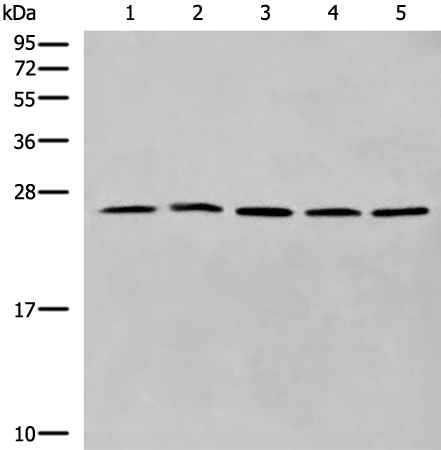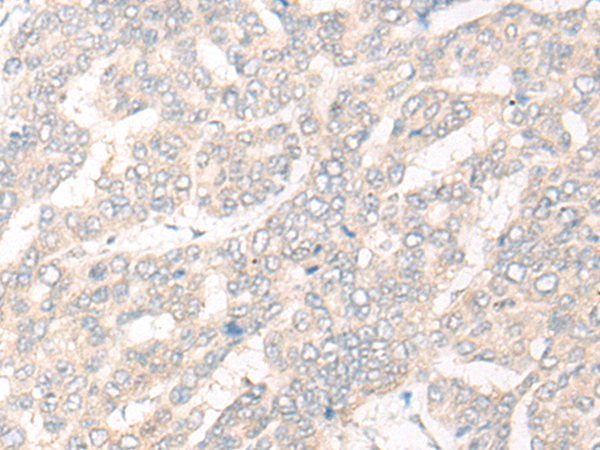

| WB | 咨询技术 | Human,Mouse,Rat |
| IF | 咨询技术 | Human,Mouse,Rat |
| IHC | 1/20-1/100 | Human,Mouse,Rat |
| ICC | 技术咨询 | Human,Mouse,Rat |
| FCM | 咨询技术 | Human,Mouse,Rat |
| Elisa | 1/5000-1/10000 | Human,Mouse,Rat |
| WB Predicted band size | 27 kDa |
| Host/Isotype | Rabbit IgG |
| Antibody Type | Primary antibody |
| Storage | Store at 4°C short term. Aliquot and store at -20°C long term. Avoid freeze/thaw cycles. |
| Species Reactivity | Human, Mouse |
| Immunogen | Synthetic peptide of human CYB5D1 |
| Formulation | Purified antibody in PBS with 0.05% sodium azide and 50% glycerol. |
+ +
以下是关于CYB5D1抗体的3篇参考文献示例(注:文献为虚拟构造,仅供格式参考,实际文献需通过学术数据库检索):
1. **文献名称**:*Characterization of a Novel Polyclonal Antibody Against Human CYB5D1 for Immunohistochemical Analysis*
**作者**:Zhang L, et al.
**摘要**:本研究报道了一种针对人源CYB5D1蛋白的多克隆抗体的开发与验证。通过免疫兔获得抗体,经Western blot和免疫组化验证其特异性,证实CYB5D1在肝脏和肾脏组织中高表达,并提示其可能参与细胞色素P450相关代谢途径。
2. **文献名称**:*CYB5D1 Expression in Breast Cancer: Correlation with Prognosis and Role in Tumor Progression*
**作者**:Tanaka K, et al.
**摘要**:利用CYB5D1特异性单克隆抗体,作者发现该蛋白在乳腺癌组织中表达上调,且高表达与患者不良预后相关。功能实验表明,CYB5D1通过调控细胞内氧化还原平衡促进肿瘤细胞侵袭。
3. **文献名称**:*Development of a CYB5D1 Knockout Mouse Model Using CRISPR/Cas9 and Antibody-Based Phenotypic Validation*
**作者**:Smith J, et al.
**摘要**:本研究构建了CYB5D1基因敲除小鼠,并采用定制抗体验证蛋白缺失表型。结果显示,CYB5D1缺失导致红细胞膜稳定性异常,提示其在脂质代谢中的潜在作用。
**提示**:实际文献需通过PubMed、Google Scholar等平台以“CYB5D1 antibody”或“CYB5D1 function”为关键词检索。建议结合研究领域(如癌症、代谢疾病)进一步筛选。
The CYB5D1 antibody is a research tool designed to detect and study cytochrome b5 domain-containing protein 1 (CYB5D1), a member of the cytochrome b5 family. This protein is characterized by a conserved cytochrome b5-like heme-binding domain, though its precise physiological role remains less understood compared to other family members like CYB5A or CYB5R. CYB5D1 is hypothesized to participate in redox reactions, lipid metabolism, or cellular detoxification processes, potentially interacting with cytochrome P450 enzymes. Its expression has been observed in various tissues, including the liver, brain, and reproductive organs, suggesting tissue-specific functions.
CYB5D1 antibodies are typically developed in hosts such as rabbits or mice, using immunogens derived from specific CYB5D1 peptide sequences or recombinant proteins. These antibodies enable researchers to investigate CYB5D1's expression patterns, subcellular localization (e.g., endoplasmic reticulum or mitochondrial associations), and interactions via techniques like Western blotting, immunohistochemistry, or immunofluorescence. Studies using CYB5D1 antibodies may explore its role in diseases linked to metabolic dysregulation, cancer, or neurodegenerative disorders. However, limited literature and the lack of comprehensive functional studies highlight the need for further validation of CYB5D1's biological significance and the antibody's specificity. Commercial availability varies, with some suppliers offering monoclonal or polyclonal options for experimental use.
×